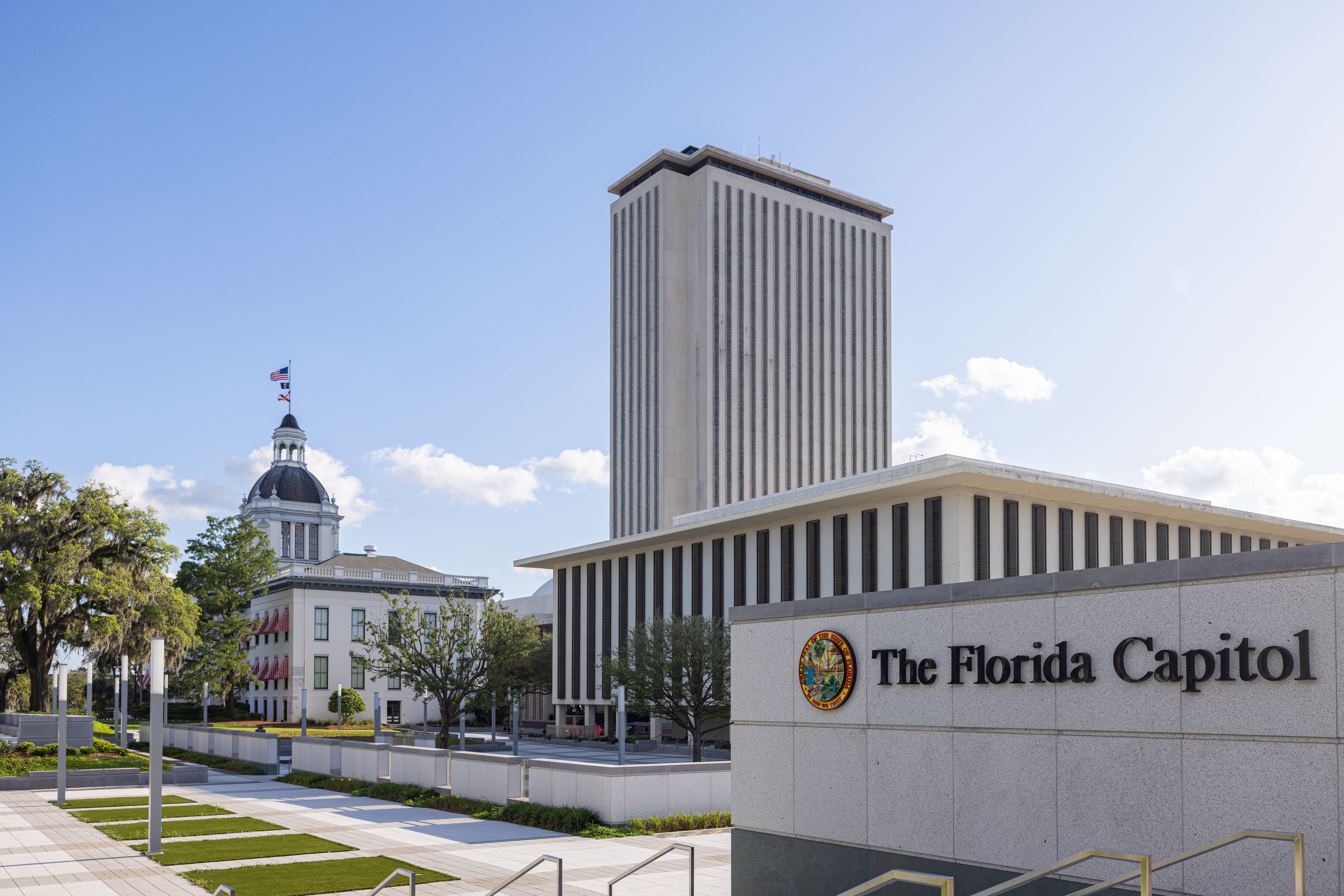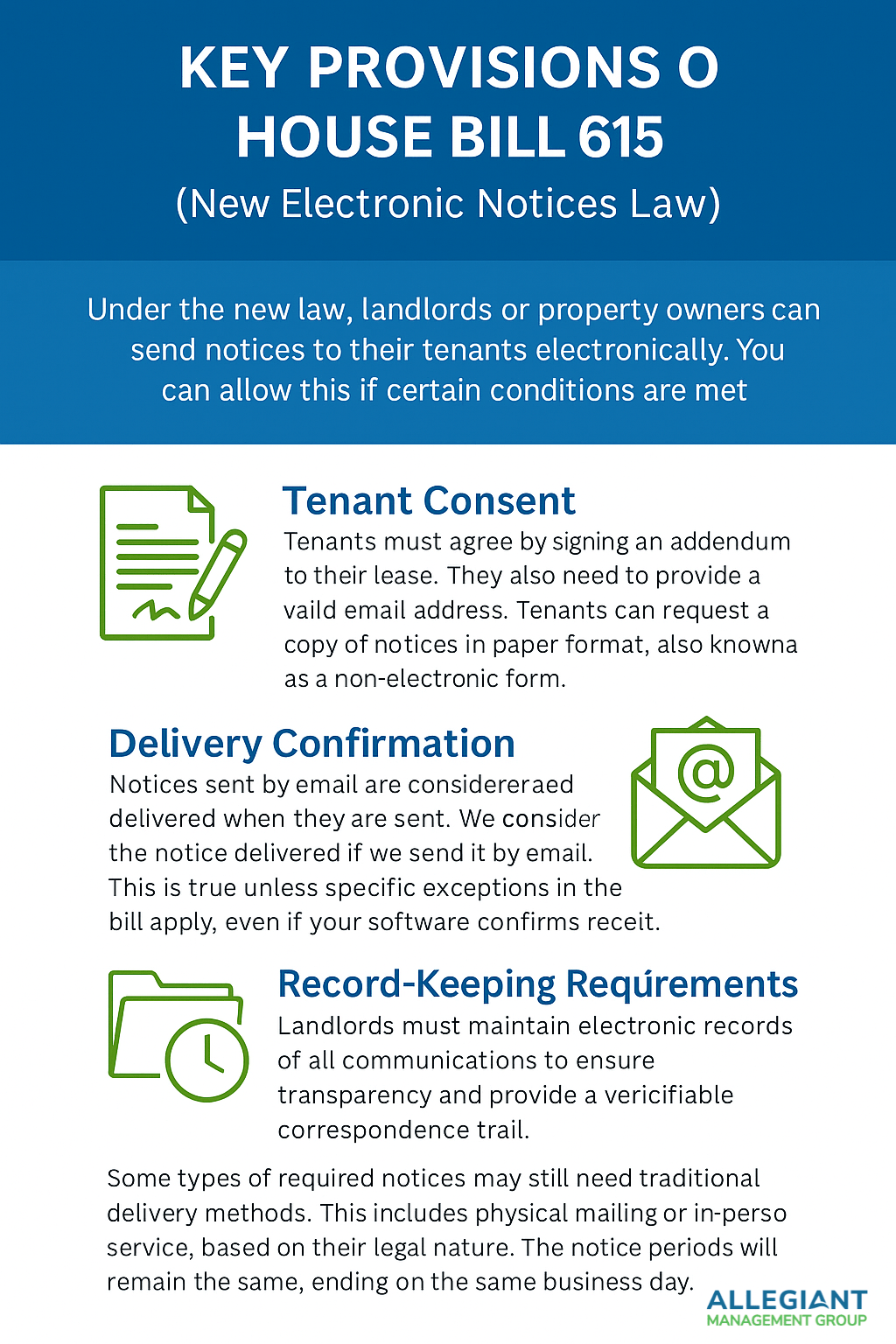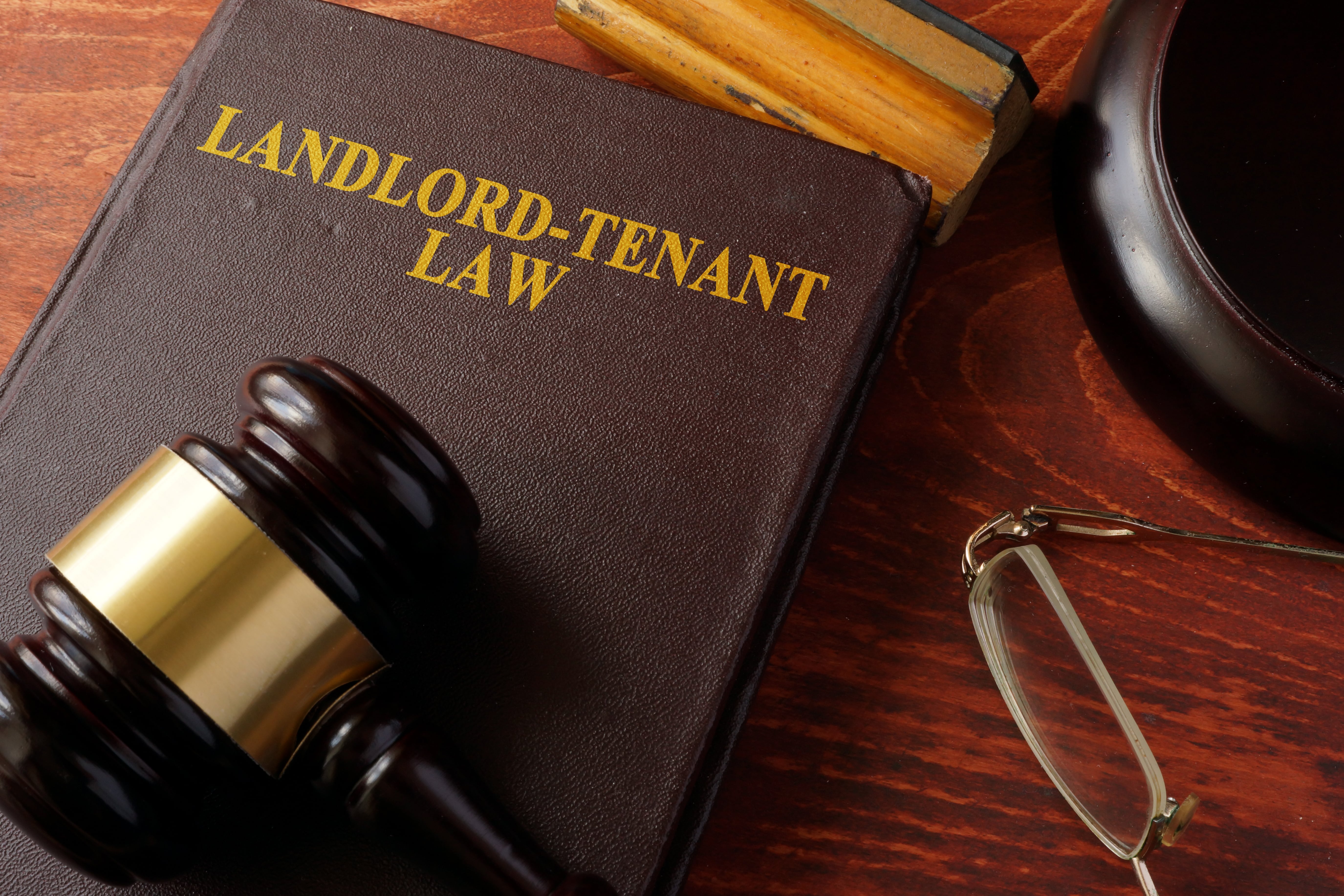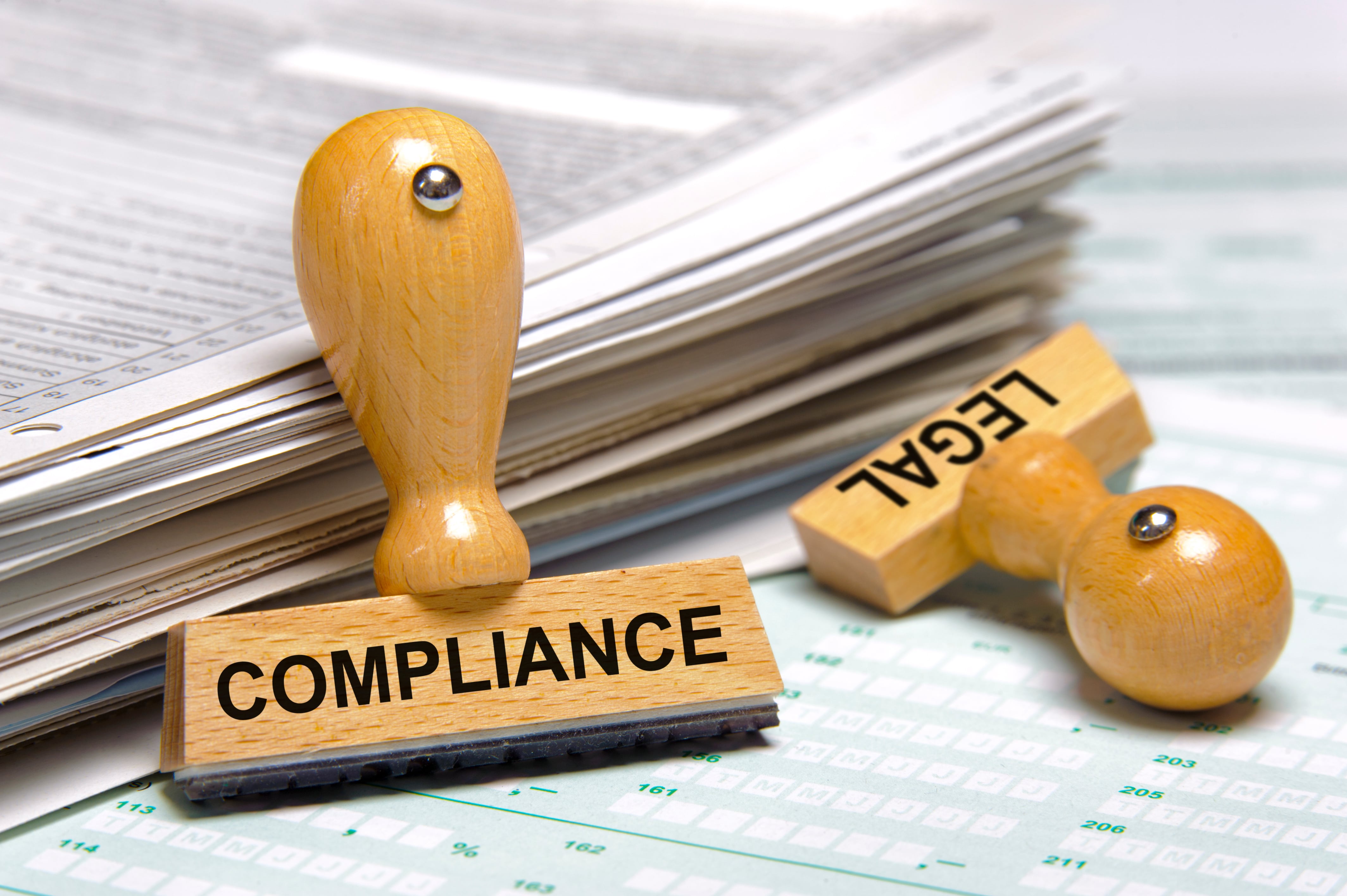Last Updated July 5, 2025
Table of Contents
- July 2025 Update
- Key Provisions of House Bill 615
- Impact on Landlords and Tenants
- Benefits of Electronic Notice Delivery
- Challenges & Considerations
- As It Happens: Up-To-Date Timeline
- What’s Next For the New Electronic Rental Notice Law
- Industry Leaders Unite for Change
- What Notices Fall Under The Rental Notices Law
- HB 615 Florida Compliance – Sample Electronic Notices Addendum PDF
- Stay Ahead with Allegiant Management Group
- Watch Now: 2025 Electronic Rental Notices Law
- FAQs – New Florida Electronic Notices Law
July 2025 Update
As of July 1, 2025, HB 615 is officially in effect and now Florida Law. Landlords and tenants in Florida can now opt in to electronic delivery of rental notices using a properly executed addendum.
Florida House Bill 615: Streamlining Landlord-Tenant Communication with Electronic Notices

In February 2025, the Florida House of Representatives introduced House Bill 615 (HB 615). This bill text is about sending notices to tenants electronically instead of requiring paper copies and delivery. This bill aims to improve communication between landlords and tenants. It allows for electronic delivery of notices instead of paper notices.
Sending electronic documents is now common for leases, rental agreements, and addendums. We handle rent payments and maintenance requests the same way. Electronic delivery altogether is the new age method. The notice requirements will be changing, if this bill becomes law.
This bill aligns with the increasing adoption of digital solutions in legal and administrative processes, enhancing efficiency and transparency in rental property management. Still delivering a true copy thereof, so it should be great for all parties. Scroll down to find the attorney-prepared Sample Electronic Notices Addendum.
Key Provisions of House Bill 615
Under the proposed bill, landlords or property owners can send notices to their tenants electronically. You can allow this if certain conditions are met
- Tenant Consent: Tenants must agree by signing an addendum to their lease. They also need to provide a valid email address. Tenants can request a copy of notices in paper format, also known as a non-electronic form.
- Delivery Confirmation: Notices sent by email are considered delivered when they are sent. We consider the notice delivered if we send it by email. This is true unless specific exceptions in the bill apply, even if your software confirms receipt.
- Record-Keeping Requirements: Landlords must maintain electronic records of all communications to ensure transparency and provide a verifiable correspondence trail.
Some types of required notices may still need traditional delivery methods. This includes physical mailing or in-person service, based on their legal nature. The notice periods will remain the same, ending on the same business day.

Impact on Landlords and Tenants

If enacted, the electronic notice law could bring several advantages and considerations for both landlords and tenants:
Benefits of Electronic Notice Delivery
- Enhanced Efficiency: Electronic delivery reduces delays associated with traditional mail and improves response times for both parties.
- Lower Costs: Landlords can save money on printing, postage, and storing documents. They also save time and energy spent on mailing or delivering notices.
- Improved Record Keeping: Digital records facilitate organized documentation, aiding in dispute resolution and compliance tracking.
Challenges & Considerations
- Digital Access Barriers: Some tenants may lack reliable internet access or technical knowledge, which could result in missed notices.
- Email Delivery Concerns: Spam filters can cause people to lose or overlook important communications. People believe they deliver an email when they send it. This is true even if the recipient does not reply. The only exception is if the law says otherwise.
- Tenant Awareness & Consent: Ensuring tenants fully understand and voluntarily agree to electronic communication is crucial to protecting their rights and avoiding unintentional consent.
This progressive bill represents a significant shift toward digital transformation in Florida’s rental housing market.
While the bill aims to streamline communication and administrative efficiency, stakeholders must ensure that accessibility, reliability, and transparency remain at the forefront of implementation.
As the bill moves forward, landlords and tenants should stay informed. They need to be ready for possible changes in property management laws.
As It Happens: Up-To-Date Timeline
Date | Legislative Event Description |
|---|---|
| March 14, 2025 | The bill was sent to the Housing, Agriculture & Tourism Subcommittee and the Judiciary Committee. |
| March 18, 2025 | The Housing Subcommittee approved the bill and added a committee substitute. |
| March 19, 2025 | The bill had its first reading in the House. |
| March 20, 2025 | It was referred to the House Judiciary Committee. |
| March 24, 2025 | The Judiciary Committee scheduled a hearing. |
| March 26, 2025 | The Judiciary Committee approved the bill with changes and filed Committee Substitute 3. |
March 27, 2025 | The bill was added to the House Special Order Calendar for April 3. |
| April 3, 2025 | The House passed the amended bill with a vote of 108–0. |
| April 7, 2025 | The bill was sent to the Senate and referred to the Senate Rules Committee. |
| April 10, 2025 | The Senate Rules Committee scheduled a hearing. |
| April 15, 2025 | The Committee approved the bill and sent it to the full Senate. |
| April 16, 2025 | The full Senate passed the bill with a 35–1 vote and sent it to the Governor. |
| April 29, 2025 | Governor Ron DeSantis signed HB 615 into law. |
What’s Next For the New Electronic Rental Notice Law
House Bill 615 / CS SB 1164 will become law on July 1, 2025. This will let landlords and tenants in Florida send rental notices by email. However, both parties must sign an addendum to agree to this electronic delivery for it to become legally binding.
We will keep giving updates and advice to help landlords and property managers use this new option correctly.
Industry Leaders Unite for Change
This significant legislative advancement resulted from the joint efforts of:
- Florida Apartment Association
- National Association of Residential Property Managers (NARPM)
- Florida Realtors
- Law Offices of Heist, Weisse, and Wolk, PLLC.
Led by attorney Harry Heist, a friend and mentor who i respect immensely. As a law firm focused on landlord-tenant issues, they are proud to help improve Florida’s rental laws. Once again.
What Notices Fall Under The Rental Notices Law
Under Florida House Bill 615 landlords can send some rental notices electronically. However, the tenant must provide written consent in an agreement or addendum to allow this.
Types of Notices You Can Send Under The Law:
- Notice to Pay Rent or Quit (balance owed on monthly rent)
- Notice of Lease Violation
- Notice of Non-Renewal
- Notice of Termination
- Notice of Entry (notice to enter the rental unit)
- Notice of Rent Increase (if required by lease or local law)
- Notice of Changes to Lease Agreements Terms
Important: The law does not apply automatically. Both the landlord and tenant must agree in writing to use electronic delivery. It must follow the legal formatting and delivery rules in the new law.
HB 615 Florida Compliance – Sample Electronic Notices Addendum PDF
If you’re looking for a attorney prepared Electronic Notices Addendum, you’re in luck! The attorneys who helped champion Florida’s new law has released a free sample addendum for email notice agreements.
Please note: do not use or sign this form before July 1, 2025, when the law officially takes effect.
Downloadable Sample Electronic Notice Addendums
Stay Ahead with Allegiant Management Group

Stay up to date on other proposed laws throughout the 2025 Legislative session. Navigating changes in landlord-tenant laws can be challenging. At Allegiant Management Group, we keep up with new laws. This helps us ensure compliance and smooth long term property management for our clients.
If you are a landlord, we can help you communicate better. If you are a tenant, we can help you understand your rights. Partner with a property management company who stays ahead of the curve.
Our expert team is here for you. Are you ready to streamline your investments? Tired of dealing with collecting rent, handling security deposits, and new laws? Let us help.
Contact Allegiant Management Group today to learn how we can help you stay compliant and enhance your rental experience!
Watch Now: 2025 Electronic Rental Notices Law
Frequently Asked Questions (FAQs) – New Florida Electronic Notices Law
What types of notices can be sent electronically under HB 615?
It enables people to send legal notices, like eviction and foreclosure notices, by email. This is only if the recipient has agreed to receive them this way. The exact types of notices may vary depending on local rules and lease terms.
How can tenants opt into electronic notices?
Tenants can give written consent—usually in the lease or a separate form. Landlords must explain which notices they will send electronically and how tenants can opt out later. Some states may require extra steps to verify the agreement.
Can tenants withdraw consent for electronic communications?
Yes. Tenants can cancel their consent by sending written notice to the landlord. After that, the landlord must go back to traditional delivery methods like mail or in-person service.
What happens if an email notice goes to spam or is missed?
If an email notice goes to spam or someone misses it, the system still counts it as delivered. This is true if the sender sends it to the tenant’s chosen email. Tenants should regularly check spam folders. Some state laws may require landlords to prove they sent the notice but not that tenants read it.
Where can i find a sample electronic notices addendum?
You can get a free sample addendum from Florida’s leading landlord-tenant law firm, the Law Offices of Heist, Weisse, and Wolk, PLLC.
When will Florida House Bill 615 go into effect?
Florida House Bill 615 becomes law on July 1, 2025.
Where can i find a sample electronic notices agreement?
A sample Electronic Notices Agreement is available in both Word and fillable PDF formats. The Law Offices of Heist, Weisse, and Wolk, PLLC provide it, and you can find the link above for easy access.
Disclaimer: The information provided in this article is for information purposes only and does not constitute legal advice.



